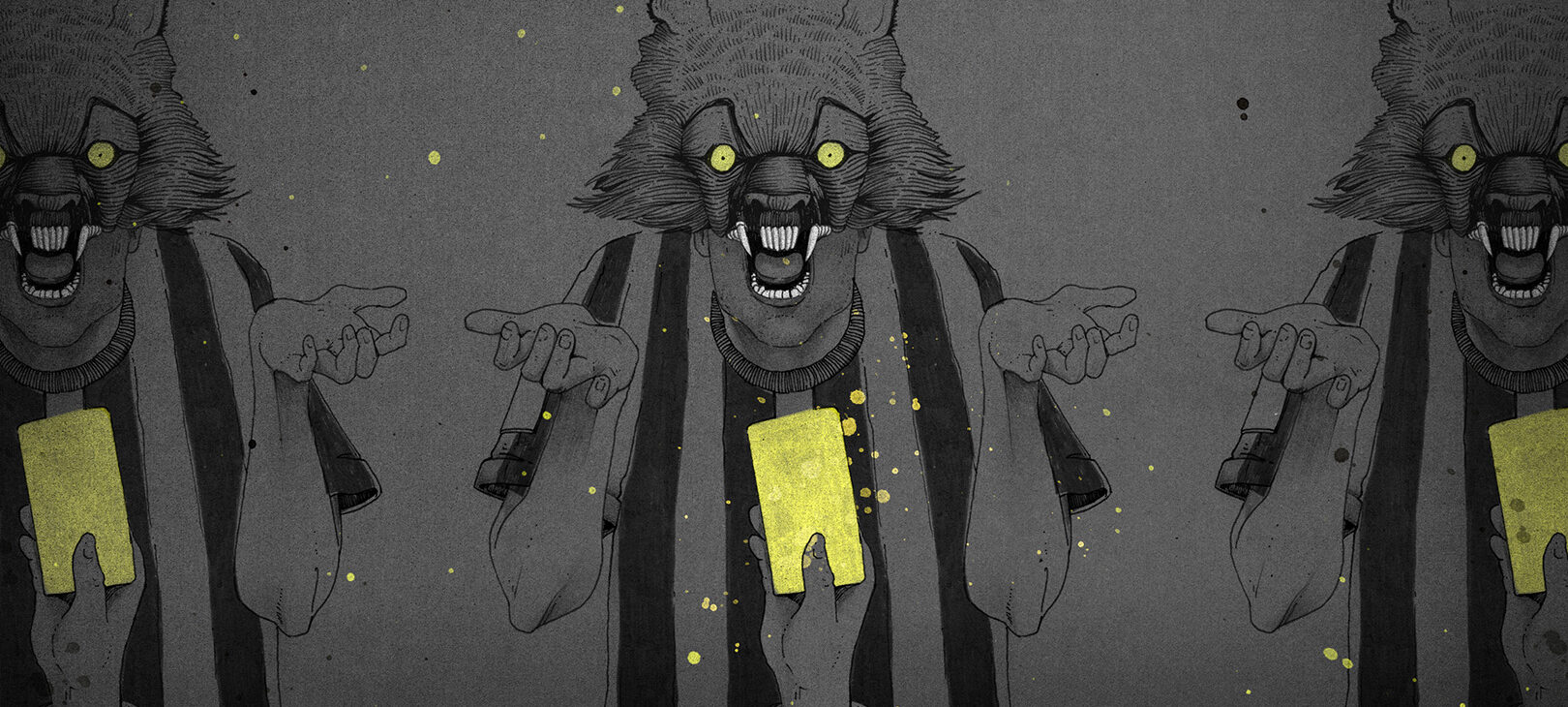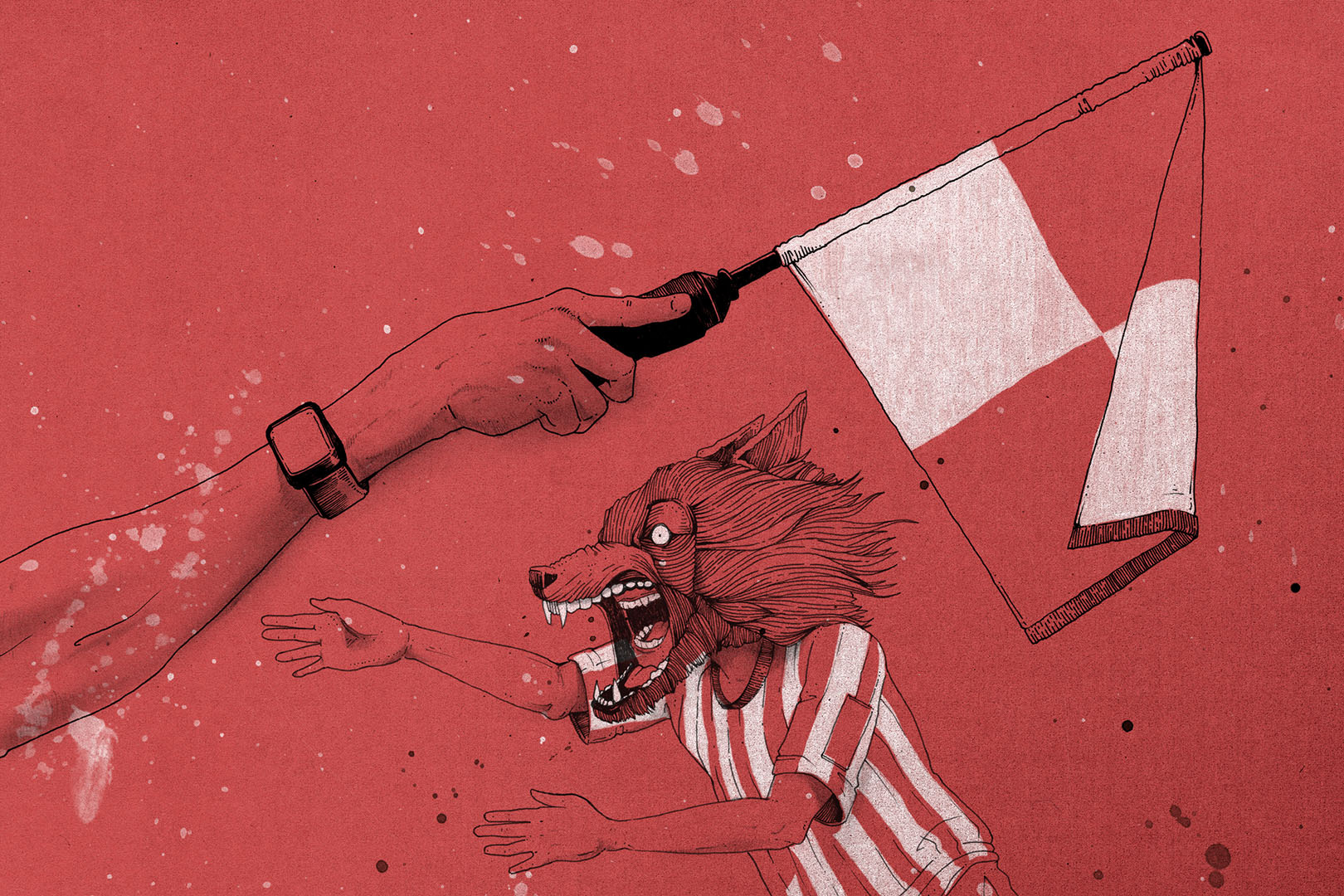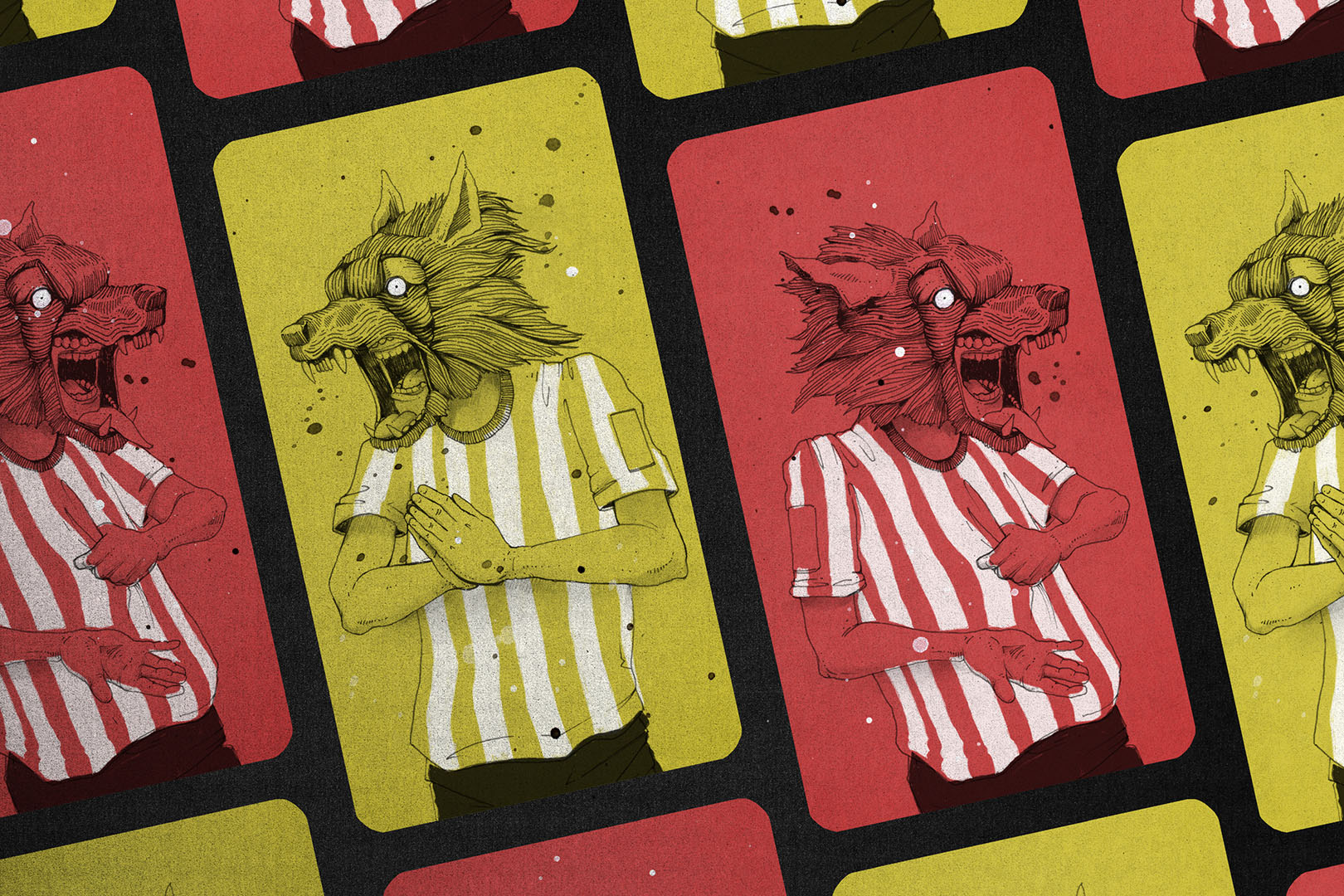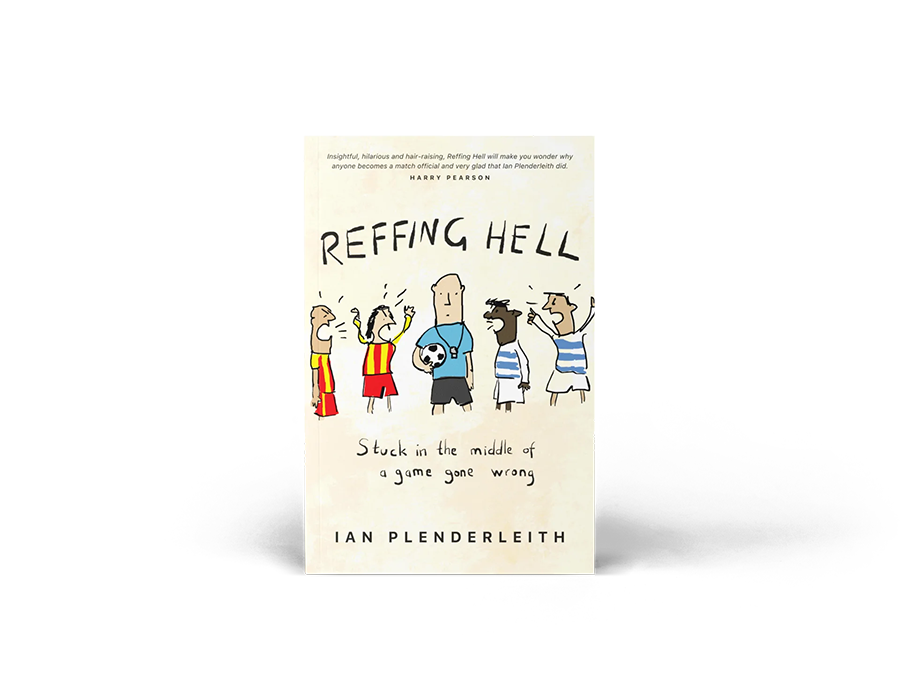
Reffing Hell: Stuck in the Middle of a Game Gone Wrong
August 13, 2022
Ian Plenderleith is the author of the fourth-most-enjoyable English-language book about soccer ever written, “Rock &. Roll Soccer: The Short Life and Fast Times of the North American Soccer League” (amongst others). When Howler received the opportunity to run an excerpt from—and to help him promote—his new book, “Reffing Hell: Stuck in the Middle of a Game Gone Wrong,” we offered a quick and enthusiastic Yes. What follows is an edited version of the book’s Introduction and four of its 125 match reports. Be prepared. You’re about to feel guilty.
It’s a cold Thursday night in February, in the 89th minute of a friendly game between two men’s teams. Grown-up, adult men, of voting age.
The game has kicked off for the second time tonight. Everyone’s shouting, many are shoving, all are absolutely indignant. “Ref, did you hear what he said to me? Did you see what he did to me?” Sometimes, the quietest game can skid off the rails for no good reason. Just bad reasons, such as perceived insults, unseen fouls or a marginal offside. Even a contested throw-in.
“Why in the name of all that’s holy would anyone spend their free time refereeing amateur football?”
“Why in the name of all that’s holy would anyone spend their free time refereeing amateur football?” is the question posed to me time and again by family and friends. What reason could any even halfway sane person give for volunteering to stand among 22 athletic and highly motivated players, with the added bonus of coaches, parents and fans to hem us all in, in order to be the sole person subject to disrespect, cursing, abuse and the threat of violence on a weekend afternoon or a weekday night?
It’s a fair question. Of course, not all games are fraught and stressful, and my stories focus on the extreme examples. No one wants to hear the yarn about the two well-behaved teams who contested a 1-1 draw and then everyone went home with a smile on their face. The extreme games, though, really affect you, and not just as a referee. Sometimes I cycle away from a football pitch and succumb to the facile temptation of bracketing the entire human race in with the players who just lost their rag at me about a late penalty kick. I try to keep such negative thoughts in check, though, and to remember that a well-managed and sometimes even lighthearted game can put a spring in my step (or a ping to my pedals).
The obvious answer is that I love football, and always will. In this case, I came up with a less sentimental response. Despite the abuse, I keep doing it because I love being out on the soccer field—most days, it’s where I feel like I belong, where I’m happiest. When you can’t quite cope with the fact that your playing days are over, refereeing is the closest you’ll come to the action, even if it means taking a misplaced shot right in the nuts.
During that Thursday night mass confrontation that started just before we were all about to head for the changing rooms, I remained quite calm. I’d seen it all before. I knew that everyone would pipe down eventually, once their bellicose posturing was over and done with. I blew three times on my whistle and began to walk off the pitch.
“Wait, where are you going?” a couple of players asked. “I’m off home because you’re all acting like idiots,” I replied. Does that mean the game’s over, they wanted to know. It certainly does. Though there’ll be another one next Sunday afternoon, and no doubt we’ll all be back out there again, ready to hotly contest another highly controversial throw-in decision…

Advantage!
Occasionally, referees may experience a moment of glory. It’s not like scoring a goal, but it’s similar. And no, it’s not when you—straight-armed and righteous—raise the red card to that purple-faced midfield goblin who just called you a blind, clueless twat. It’s when you cry the word “Advantage!” and just a few seconds later the attacking team sticks the ball in the net.
It happens just over an hour into a closely fought and very well played game between the first team of a small town and the reserve team of a neighbouring, much bigger town. The score is 1-1. The home team’s number 7—a hot-headed but extremely nimble central midfielder—has been sandwiched by two opponents just inside the away team’s half. As he falls and howls for the foul, the ball squirts forward to one of his team-mates, who with a first-time pass puts their number 11 through on goal. The whole time I have my arms stretched out and am exhorting them to play on. The number 11 needs only two touches to score from just inside the penalty area.
In such moments, you remember what it was like to score a goal. In the interests of neutrality, it’s best not to scream out “Yes!” and punch the air. Or to run over and join in the goal celebrations. But that’s exactly what you feel like doing. And for the next few minutes I have that pleasant ‘aftergoal’ sensation I used to feel after a successful strike, at the same time as having to keep myself in check and return to fully concentrating on the game.
Still, fucking excellent call, ref! Says precisely no one. Not during the game, and not after. Three minutes before time, with the score now at 4-1, I miss a handball by the away team thanks to the glare of the floodlights. It’s a very obvious handball judging by the incredulous cries of the 40-odd spectators and the querulous yells of the home team. When the home manager shakes my hand after the game he says, “That was a clear handball, you know.”
Yeah, I know. Didn’t matter much by then, though, did it? Main thing was my application of that critical advantage call, right? Forget it, you idiot, that was half an hour ago. They’ll only remember you here as the ref who needs night-vision glasses. If it’s gratitude you want, go found a charity.
Final score: 4-1 (1 x yellow)

Missing a clear penalty
When the coach is screaming at you, there are usually two options. Either ignore him (it’s almost always a him), or card him. Sometimes there is a third option, though it’s not the ideal path. You try and talk to him and justify your decision. Because perhaps you already know that you fucked up.
It’s the second half of a boys’ U13 game, and so far everything’s been quiet. The away team is leading 1-0, and is clearly the better side. On a rare home team attack, a forward is through on goal on the right side of the penalty area and tries to lift the ball over the keeper. His lob is so hopelessly wide that the ball remains in play out on the left side. I keep my eye on the arc of the ball (an error), and only see out of the corner of my vision that the goalkeeper has crashed into the forward. The home coach screams for a penalty, but I’m already following the play. When the forward doesn’t stand up, I stop play and wave the coach on to treat him.
As he’s tending to his forward, he has some strong words about the challenge. My main concern is the player’s health, and so I ignore the penalty issue. The player’s okay to continue, though he’s a little shaken, and I restart the game with a drop ball.
The home team loses 2-0, and after the game the home coach comes over to say thanks and bump fists. It’s me that brings the penalty incident up. “I didn’t give a penalty because I saw it as a collision between the two players…” I start, but he interrupts me, suddenly incensed again, and says, “The keeper laid my player out flat. It was a clear penalty.” And he leaves it at that. As I walk back to the clubhouse, I start to admit to myself that he’s right. I’ve given decisions like that before against goalkeepers, and I can’t explain why I didn’t give it today.
A few minutes later the coach comes into my changing room to pay me. “Look,” I say. “About the penalty call. I think you were right. I’m sorry, I screwed up, it should have been a spot-kick.” Immediately he relaxes and sits down, and we talk about the game. His team’s just been promoted to a higher level and are still getting used to playing stronger teams, he says. He knows that the end result was a fair reflection of play, but still, it would have been nice to have had the chance to gain a point—if the
referee hadn’t inexplicably failed to award them a penalty. He doesn’t say this last part out loud, and we part on amicable terms. I know he’s doing a demanding job in his free time on a volunteer’s salary of nil, and for once I feel no resentment at a coach for having lost his rag.
I’ve also argued before that a foul in the penalty area is a penalty, no matter how ‘soft’. At the same time it’s true that most referees, even subconsciously, set a higher bar for fouls in the box. It’s often a gamechanging decision, after all. And it’s much easier to wave away a penalty appeal because the protests dissipate much quicker and the game moves on. Call a penalty on a borderline decision and you might find yourself surrounded by angry players (though not, hopefully, at U13 level), and the reproaches can continue long after the final whistle. In this case, I bottled the decision because a foul by the goalkeeper coming out to challenge a forward can so easily be dismissed as a collision.
Every game, we learn and move on, even at my age. I’m still unhappy with my own error, but at least my apology was accepted.
There had already been one apology during the game after an away player absolutely wiped out an opponent with a very late challenge. There are no yellow or red cards at this level, but you can give a five-minute time penalty. When the lad returned to the field after his punishment, he came up to me and sincerely said sorry for the challenge, which I knew had been ill-judged rather than malicious. We all make mistakes, lad. And we’ll all continue to make them.
Final score: 0-2 (1 x time-penalty)
When this ‘shit job’ is a breeze
Before leaving the house, I spend an hour reading the newspaper. The Taliban is marching unhindered on Kabul, taking us back to square one after 20 years of death and futility. The two sides in the Ethiopian civil war are gearing up for the next round of conflict. Floods and serial wildfires around the globe are still not sparking the necessary political will to save our planet. I fold up the paper and cycle off to referee a game between two of the city’s diaspora sides, who once formed part of the same country. Within living memory, they engaged in a war that cost an estimated 22,000 lives before two new states were formed—Serbia and Croatia.
There are several teams in our city formed by exiles from the forme Yugoslavia. Some were founded by migrant workers in the 1970s, others came into existence later as a result of the various population-shifting conflicts that hit the state during its 1990s break-up. One of today’s teams was formed in 1973, and became a go-to club for Serbian immigrants. Their opponents were originally a pan-Yugoslavian side, but professed themselves to be a Croatian club in the 1990s, prompting their Serbian members to leave for the other team. The city’s ‘Balkan derbies’ during that decade could attract crowds several hundred strong.
It’s always worth doing your research, but it’s even more important to approach a game without expectations, be they good or bad. True, I once refereed a cup tie here between teams from a region of historical conflict that for 90 minutes teetered on the verge of something much more than a game of football (see ‘Putting Out Fires’). But the only thing awaiting me at today’s game is a journalist from a Serbian newspaper published for the ex-pat community. He wants to know if he can take a picture of both teams together before kick-off. If they’re on board, you certainly don’t need my permission, I tell him. I also take a snapshot of the two teams, who then all shake hands in the centre circle—which we’re no longer supposed to do because of Covid, but this seems like a worthy exception.
There’s really not much to write about the game itself, other than to say it was the most peaceful I’ve officiated in this country since the Japanese high-schoolers came to town. Any fouls are followed by apologies and a helping hand. At one point, the coach of one side quickly steps on to the field to spray the injured foot of an opponent. Strictly speaking, he needed my permission, but I’d have to be an idiot to raise an objection, let alone show him a yellow card. There is barely a complaint about a decision all afternoon, bar one or two courteous questions. The captain of one team, a central defender, wins every single challenge—both aerial and on the ground—without committing a single foul. There are around 150 spectators, but there’s no caterwauling and cat-calling about offside decisions. After the game, the teams drink beer together around a barbeque.
I’m not a fan of mawkish homilies about football bringing people together, because I’ve seen way too much belligerence in this city over the past seven years to believe there’s much truth to such a trite simplification. But I tell the Serbian journalist after the final whistle that it was an absolute pleasure to ref this one, from start to finish. If I had a good game, it was because the players made it easy for me to have a good game. There’s not a single incident where I even think about pulling out a yellow card. It’s as though the weight of a traumatic, violent history is leaning on the players to practice good behaviour. An optimist might venture that the feud is so exhausted that it has no energy left for even the slightest confrontation.
At half-time, one of my club-appointed linesmen comes over for a chat. “I was a ref for 35 years,” he says. “It’s a shit job. You’re running a good game.” But when the teams are disciplined and just here to play sport, this shit job is a breeze.
Final score: 4-0 (no cards)
Eye of the Fucking Tiger
“Nooooooooo!” It’s still 40 minutes to kick-off, but already I’m in mental agony. My changing room is next door to the away team, and they’re playing motivational warm-up music. There seem to be only two criteria for such music—it has to be blasted out at an intrusively loud volume on a below-par sound system, and the choice of song has to be the most unimaginative shite with the perceived widest appeal. In today’s case, Eye of the fucking Tiger. They can’t hear my cri de coeur, of course, because Eye of the fucking Tiger is way too loud. I can’t stress enough how much I hate this song. That dumb, macho opening riff I’ve heard 25,000 times too often. The whiney vocals. The asinine lyrics. And everything else about it, which sticks in my poor, suffering head for the entire first half.
If the International Football Association Board gave me free rein to add just one law to the game, then it would be this: “Teams playing loud pre-match motivational music that annoys the ref will be issued with a collective eleven yellow cards prior to kick-off. No exceptions. Should that pre-match music consist of Survivor’s Eye of the Tiger, those cards will be red, the game will be abandoned, and the opposing team awarded a 25-0 win. The ref shall be permitted to access the offending team’s changing room with a heavy hammer to attack the source of the music and render it beyond further sonic re-production.”
I think that’s reasonable. It certainly makes a lot more sense than the comical handball law the IFAB’s now had to retract and semi-restore to its original state.
So, to the game. It’s questionable why the away team felt the need to musically pump themselves up for this one. It’s a men’s friendly, and both teams are playing for the first time in nine months. It’s humid and over 30 degrees, and we’re playing in the sun. Both sides have enough players to sub out almost their entire teams at half-time. Even then, I agree to a water break, and they need it. The first pause for refreshment is hardly over before they start asking me how much longer to go. Soon players give up moving for any ball that’s not directly played to their feet. There are a lot of goals—less down to attacking agility, more due to defensive immobility.
Still, everyone’s too knackered to moan about any decisions and it’s a quiet afternoon. It’s not exactly what you’d call “the thrill of the fight/Rising up to the challenge of our rival”, even though there are 11 goals. It’s officially the end of the calendar year, and as of next weekend, the ‘new’ handball law will apply. Though, sadly, not my draft law about pre-match music. The pertinent song is now back in my head thanks to me sitting down to type this blog entry. Survivor fans among you will see that as harmonic justice, but I’ve got the guts, I’ve got the glory, I’m going the distance and I’m not going to stop until FIFA adopts the law word for word as set out above. Just a ref and his will to survive and outlaw Eye of the fucking Tiger.
Final score: 6-5 (2 x yellow)

You can pick up Ian’s latest book, “Reffing Hell” UK print version at Halcyon Publishing and the Kindle version at amazon.com for US readers.

Contributors
Ian Plenderleith
Ian Plenderleith (1965-) is a soccer writer and journalist who has been covering the game in the US, Germany, Switzerland and his native UK for the past 25 years. His books include a collection of soccer fiction aimed at an adult audience, ‘For Whom The Ball Rolls’ (Orion, 2001), and ‘Rock n Roll Soccer: The Short Life and Fast Times of the North American Soccer League’ (Thomas Dunne Books, 2015), a historical analysis of the role of the NASL in US soccer history. He has contributed columns, commentaries, player profiles, match reports, historical features and satirical news to numerous newspapers, magazines and websites, including The Wall Street Journal, The Guardian, When Saturday Comes, and Soccer America. After 16 years in Washington DC as a coach, referee, writer and slowly retiring player, he now lives and works in Frankfurt, Germany.
Christopher Berry
Christopher Berry is an illustrator with a designer’s day job in Minneapolis, MN. More work currently on view at codexnonsensica.com and on Instagram.
Creative Sponsor
Howler doesn’t have millionaire owners, just a determination to tell stories in and around the game we love that no one else would tell. Our sponsors make that possible by providing support for the writers, artists, photographers and contributors who are the heart and soul of what we do. Please support our sponsors.
![]()
This article is presented by Away Days Brewing Co. and they focused on creating the perfect combination of classic styles with English balance and European flair. The modern and intimate SE Portland taproom has ten rotating taps as well as two cask engines.
TAGS
